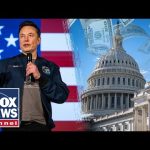Protests against Elon Musk and his electric vehicle company, Tesla, have erupted across the United States and Europe, with activists targeting Tesla showrooms and service centers in what they’ve dubbed the “Tesla Takedown.” These demonstrations are part of a broader backlash against Musk’s role as head of the Department of Government Efficiency (DOGE), a position he assumed under the Trump administration. Critics accuse Musk of wielding his immense wealth and political influence to implement sweeping government cuts, which they claim undermine essential programs like Social Security. The protests, while largely peaceful, have seen isolated incidents of vandalism, including Tesla vehicles being set on fire—acts condemned by U.S. Attorney General Pam Bondi as domestic terrorism.
At the heart of these protests is Musk’s controversial leadership of DOGE, where he has aggressively pushed to downsize federal agencies and reduce public spending. His critics argue that these actions disproportionately harm vulnerable populations, particularly seniors who rely on Social Security benefits. Democratic Congressman Jake Auchincloss has been vocal in condemning Musk’s policies, accusing him of spreading misinformation about Social Security fraud as a pretext for dismantling the program. Auchincloss has vowed to fight any attempts to privatize or weaken Social Security, framing it as a cornerstone of American society that must be protected from corporate overreach.
Musk’s defenders, however, see his efforts as a necessary step toward reducing government inefficiency and curbing wasteful spending. They argue that DOGE’s initiatives are vital for addressing America’s ballooning national debt and ensuring long-term fiscal sustainability. Republicans have largely supported Musk’s approach, with some lawmakers maintaining close ties to him to advocate for specific programs or exemptions from cuts. This divide underscores the broader ideological battle over the role of government in providing social safety nets versus fostering economic independence.
The protests also reflect growing discontent with Musk’s perceived entanglement of business and politics. Activists accuse him of using his position to benefit Tesla and other ventures while neglecting ethical considerations. Environmental groups have joined the movement, criticizing Tesla for failing to live up to its green promises despite Musk’s public claims of environmental stewardship. These criticisms have contributed to a decline in Tesla’s sales and reputation, with some former customers divesting from the company in protest.
As debates over Social Security and government efficiency rage on, Musk remains a polarizing figure at the center of these controversies. His supporters view him as a visionary leader tackling systemic problems head-on, while his detractors see him as an emblem of unchecked corporate power threatening democratic institutions. The outcome of this struggle will likely shape not only Musk’s legacy but also the future direction of American governance and public policy.




